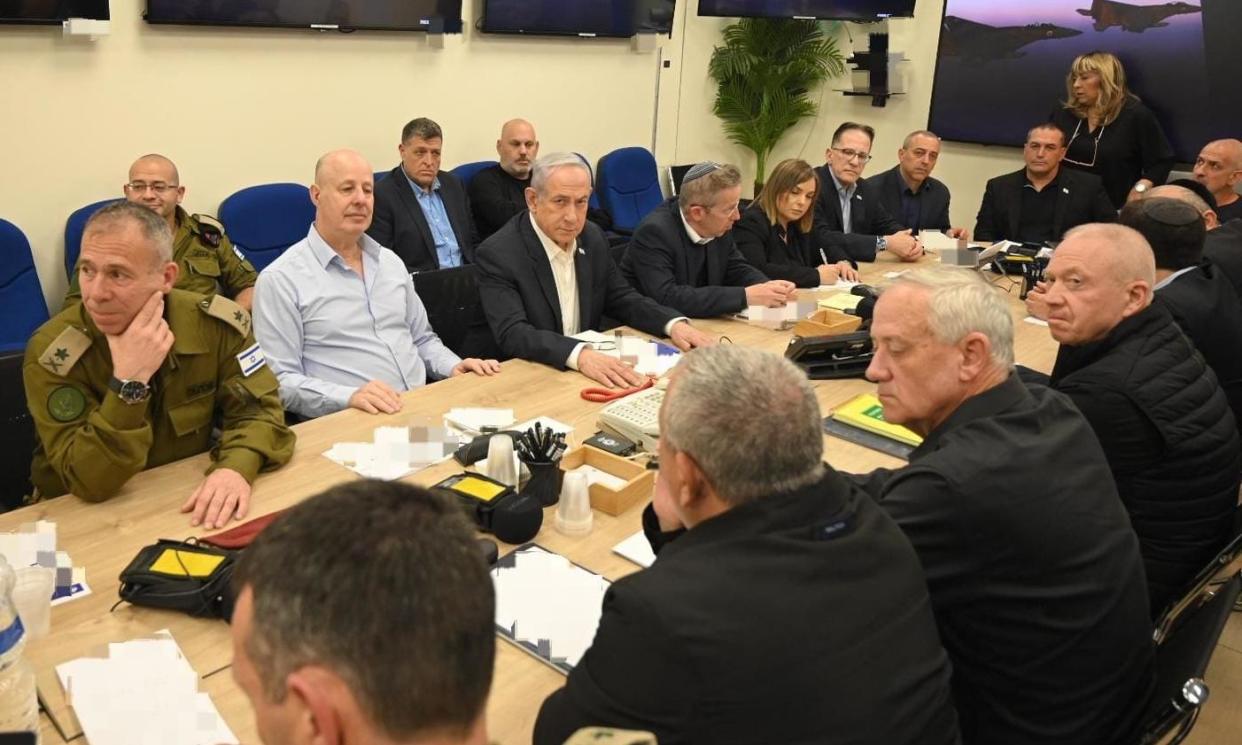Israeli war cabinet to meet again to consider response to Iran’s attack

Israel’s war cabinet is to convene again as the country continues to deliberate how to respond to Iran’s unprecedented missile and drone assault on its territory.
The three-man war cabinet– the prime minister, Benjamin Netanyahu, his defence minister, Yoav Gallant, and Benny Gantz, a former defence minister and centrist Netanyahu rival, as well as several observers – will meet at 2pm local time (1200 BST) on Monday. It last convened late on Sunday.
Statements from Gallant and Gantz on Sunday afternoon, in the aftermath of the successful interception of more than 300 missiles and drones fired directly from Iranian territory for the first time, suggested a direct Israeli response to Tehran was not imminently on the cards.
The prime minister, however, is yet to declare a formal decision, and the rest of the world remains on high alert for potential escalation triggered by the six-month war in Gaza.
US and Israeli media reported that late on Saturday, when it became clear an Iranian attack had been launched, Israel’s war cabinet decided to strike back, but was dissuaded by Joe Biden in a 25-minute phone call between the US leader and Netanyahu in the early hours of Sunday.
Biden reportedly told Netanyahu that given the fact the attack caused minimum damage, Israel should consider the incident “a win” and not respond militarily.
CNN, citing an unnamed Israel official, said Israel would respond to Iran’s attack but the scope of this had yet to be decided.
R Adm Daniel Hagari, Israel’s chief military spokesperson, made clear that Israel was keeping its options open. “Over the last few hours we approved operational plans for both offensive and defensive action,” he told reporters on Sunday.
World leaders continued to call for restraint and de-escalation on Monday even as some said an Israeli response was to be expected. The EU foreign policy chief, Josep Borrell, told the Spanish radio station Onda Cero that the Middle East stood “on the edge of the cliff” and “we have to step on the brakes and reverse gear”.
The “profound division” within Israel’s rightwing governing coalition between hardliners seeking fierce retaliation and a “more moderate and sensible” faction complicated the situation, he said.
The British Foreign Secretary, David Cameron, said the UK did not support a retaliatory strike, while the French president, Emmanuel Macron, said Paris will try to “convince Israel that we must not respond by escalating.” Kremlin spokesman Dmitry Peskov said further escalation was “in no one’s interests.”
US officials have said the Iranian salvo, which included more than 100 ballistic missiles, could have been catastrophically destructive had they not been intercepted, and would have made a regional war much more likely.
Related: Why Israel’s attack on Iranian consulate in Syria was a gamechanger
Iran’s foreign ministry said on Monday that “no pre-arranged agreement was made with any country” before Iran’s attack in retaliation for a 1 April strike attributed to Israel that killed several Iranian Revolutionary Guards officers at a consular building in the Syrian capital, Damascus.
Regional officials, including Iran’s foreign minister, had previously said Tehran had given notice to neighbouring countries days before its attack, which gave Israel and allies the US, UK and Jordan time to convene a significant defensive response.
Also on Monday, Iran’s foreign ministry said the west should “appreciate Iran’s restraint in recent months”.
“Instead of making accusations against Iran, [western] countries should blame themselves and answer to public opinion for the measures they have taken against the ... war crimes committed by Israel” in its war against Hamas in Gaza, said the ministry’s spokesperson, Nasser Kanani.
Normality was somewhat restored in Israel on Monday after an announcement from the the Israel Defense Forces’ Home Front command the night before that schools could reopen. Officials said they had chosen to wait 24 hours in case of additional attacks from Iran’s proxy groups and allies in Lebanon, Syria, Iraq and Yemen, all of which have joined the fray since Hamas attacked Israel on 7 October last year. Some international carriers have suspended flights to and from the region until at least Thursday.
Overnight, a drone travelling from the east was shot down by Israeli jets, the military said, and tit-for-tat attacks with Hezbollah, the powerful Iran-backed Lebanese militia, continued into Monday. Al Mayadeen, a Hezbollah-linked news outlet, said Israel had attacked targets in the towns of Dhayra and Naqoura.


